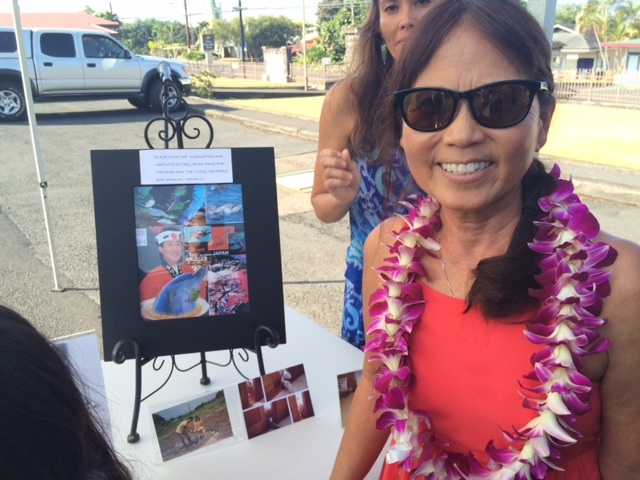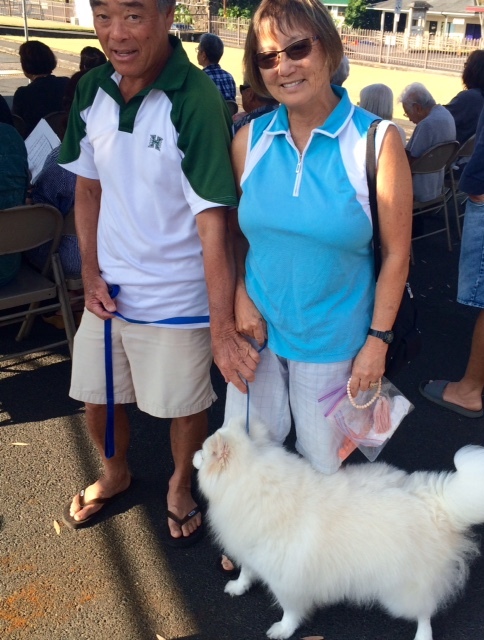Forty members Kona Hongwanji in Kealakekua gathered Sunday under a white tent outdoors in a makeshift place of reverence for a “Pet Memorial and Appreciation Day.” Black dogs, white dogs, small brown and tan dogs, even a dog sitting in a woman’s purse, stood beside their loving owners as minister Bruce Nakamura presided over the group, his black Buddhist robe swaying in the mauka breeze that carried wafts of incense to the heavens.
Norma Matsumoto, president of the Kona Hongwanji kyodan, said that the Valentine’s Day service was sponsored by the temple’s youth group.
“Everyone is encouraged to bring pictures of not only their cats and dogs but any kind of pet they have loved, and place it on this table for blessings,” she said. “We also welcome people to bring their pets that are still with us as a show of our appreciation.”
Matsumoto put her hand on the bright upturned face of her fluffy miniature Samoyed. Then she added, “I wanted to bring my cat too but I thought that might be a little much.”
The entire sangha stood, led by Nakamura in a song.
“It’s a children’s gatha or hymn,” Matasumoto whispered to me, “But today it is fitting for everyone.”
The gatha celebrates the path of a bird, a pup, a cat and a fish in each verse. It is a simple song with a catchy tune, easy for children to hum: “Run, run, little pup, Buddha loves you, little pup…”
After the gatha, Nakamura delivered an address to his sangha. He talked about the day the Buddha left this world.
“Death is only the end of this physical body. He who only sees this body, doesn’t truly see me.”
Nakamura continued to describe how on the day of the Buddha’s passing, creatures great and small gathered in the forest to mourn. He explained the Buddha had been reborn countless times, sometimes as a king, sometimes as a peasant, sometimes as an animal. In each incarnation though, he always sought to help others in his design of wisdom and selfless compassion.
Nakamura then told the sangha a Jataka tale, The Magic Pig. He looked through the group and all its four-legged members.
“It doesn’t look like anyone brought a pig today, but that’s okay.”
Everyone laughed. Maybe next time.
The tale was of a woman who finds two baby pigs and raises them with such love and kindness that they become like her children. The pigs become huge and healthy and the talk of the village. At some point, ruffians decide that the pigs are too good not to eat, so they offer the woman a good price for her pigs. But of course she can not sell them. She loves them like children. But the ruffians will not take no for an answer and have decided to take the pigs by force. One of the pigs becomes frightened, so as a means to soothe the pig’s fears, the other pig begins to sing. It is the sutra of the perfection of love. It pierces the ears of the ruffians but fills the village with an enchanting song. The song flows out in all directions until it is heard by a king who wants to know where those magical lovely sounds are coming from. The king finds the woman and her pigs and gives them a home and his protection.
“Today’s service is a reminder,” Nakamura concluded, ” that our pets past and present, are a part of our family.”
After the service, everyone was invited to gather at the blessing table to share with each other the photos of the pets no longer with them.
Simmy McMichaels stood among the displays of pets of the past, but her display was different. The photos showed dolphins both in play and in peril, being harvested by Japanese fisheries.
“I have swam with these dolphins,” she said. “But now these dolphins are being slaughtered in Japan without even anyone knowing about it. It is not the Buddha way. I wanted to bring attention and blessing to them.”
After a beloved pet dies, the grief for a family can be overwhelming. How these animals can become such a part of our sense of family, love and kinship is one of life’s beautiful mysteries.
Sunday at the Kona Hongwanji Buddhist Temple, it was a day to celebrate that mystery and share in the joy and sadness of it.











